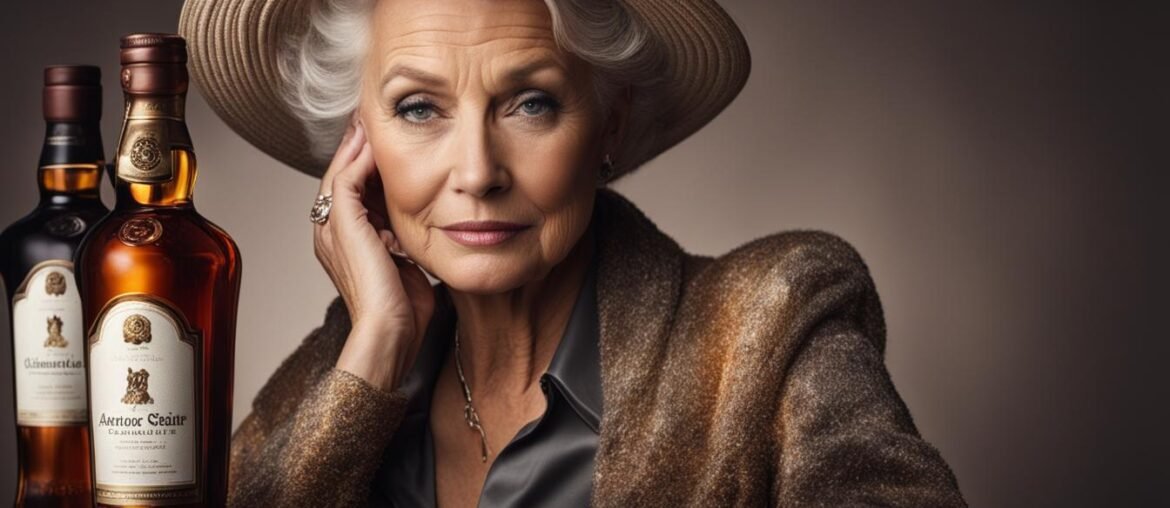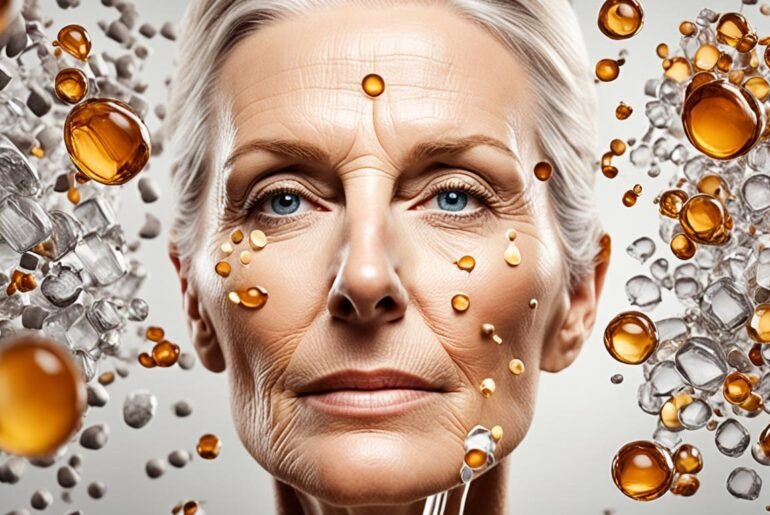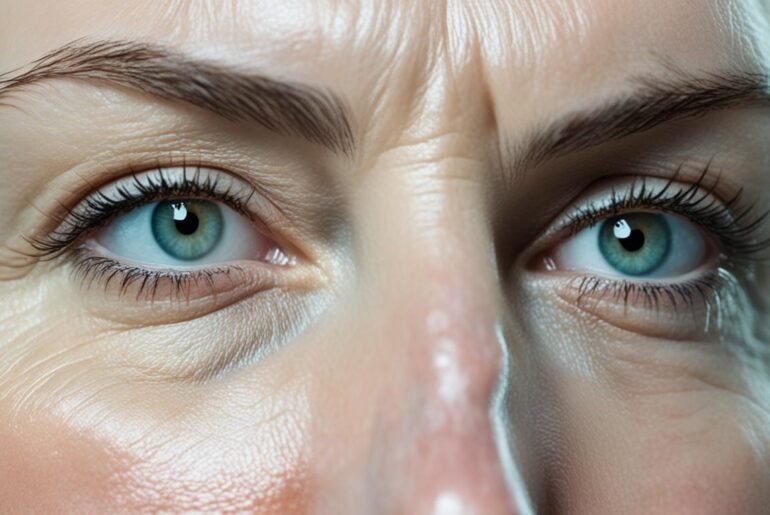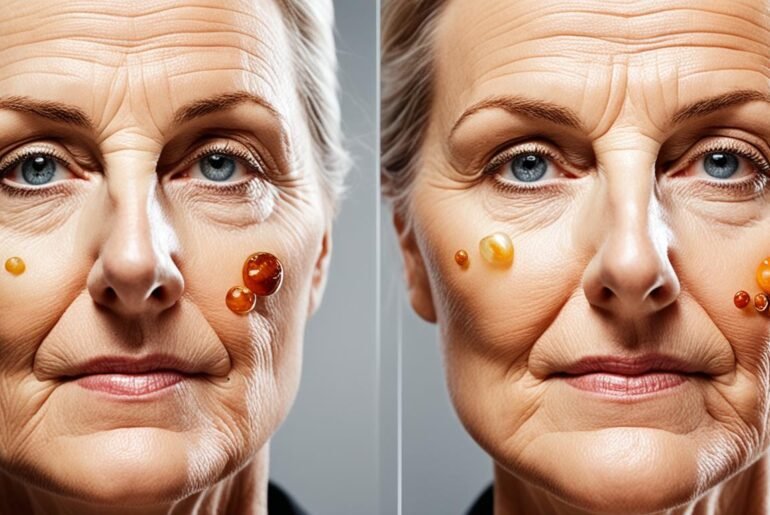Did you know that alcohol consumption can lead to premature skin aging? According to studies, excessive intake of alcohol can have detrimental effects on the skin, causing the development of wrinkles, loss of elasticity, and other signs of aging. This shocking revelation highlights the significant impact that alcohol can have on our skin health and overall appearance.
As we delve deeper into the relationship between alcohol intake and premature skin aging, we will explore the specific effects of alcohol on the skin. From facial aging to skin dehydration, we will uncover how alcohol abuse can accelerate the aging process and leave lasting damage on our skin.
Join me on this illuminating journey as we uncover the harmful effects of alcohol on our skin and discover the steps we can take to protect our skin health and maintain a youthful appearance.
Key Takeaways:
- Excessive alcohol consumption has been linked to premature skin aging.
- Alcohol can cause wrinkles, loss of elasticity, and other signs of aging.
- Facial lines and volume-related aging are particularly impacted by alcohol intake.
- Alcohol depletes vitamins and dehydrates the skin, leading to further aging effects.
- Poor sleep quality due to alcohol consumption can accelerate skin aging.
The Impact of Alcohol on Facial Aging
Research has found that smoking and heavy alcohol consumption can significantly impact facial aging. Smokers tend to have increased severity of forehead wrinkles, crow’s feet, and glabellar lines, as well as other signs of aging. Heavy alcohol use is associated with upper facial lines, under-eye puffiness, and midface volume loss. Both smoking and alcohol consumption can contribute to premature skin aging.
Effects of Smoking on Facial Aging
Smoking tobacco has been shown to have detrimental effects on the skin, leading to premature aging. The harmful chemicals in tobacco smoke can cause blood vessels to narrow, resulting in reduced blood flow and oxygen to the skin. This can lead to the formation of wrinkles, fine lines, and a dull, uneven complexion. Smoking also depletes collagen and elastin, proteins essential for maintaining skin elasticity and firmness.
“Smokers tend to have increased severity of forehead wrinkles, crow’s feet, and glabellar lines.”
Impact of Alcohol Consumption on Facial Aging
Alcohol consumption can also accelerate the aging process and impact overall facial appearance. Excessive alcohol use can lead to the development of upper facial lines, such as those found on the forehead and around the eyes. These lines can become more pronounced with prolonged and heavy alcohol consumption.
Additionally, under-eye puffiness is a common sign of alcohol-related facial aging. Alcohol dehydrates the body, including the delicate skin under the eyes, leading to puffiness and a tired, aged appearance.
Furthermore, heavy alcohol consumption can contribute to midface volume loss. This means that the natural fat pads in the cheeks gradually become thinner, causing the face to appear hollow and saggy.
“Heavy alcohol use is associated with upper facial lines, under-eye puffiness, and midface volume loss.”
Comparison of Smoking and Alcohol-Related Facial Aging
While both smoking and heavy alcohol consumption contribute to facial aging, they can have varying effects on different areas of the face. The following table provides a comparison of the impact of smoking and alcohol on facial aging:
| Facial Aging Effects | Smoking | Alcohol Consumption |
|---|---|---|
| Forehead wrinkles | Increased severity | Less pronounced |
| Crow’s feet (around the eyes) | Increased severity | Less pronounced |
| Glabellar lines (between eyebrows) | Increased severity | Less pronounced |
| Under-eye puffiness | Less common | More common |
| Midface volume loss | Less pronounced | More pronounced |
As evident from the table, smoking tends to have a more pronounced impact on forehead wrinkles, crow’s feet, and glabellar lines, while heavy alcohol consumption is associated with under-eye puffiness and midface volume loss.
Effects of Alcohol on the Skin
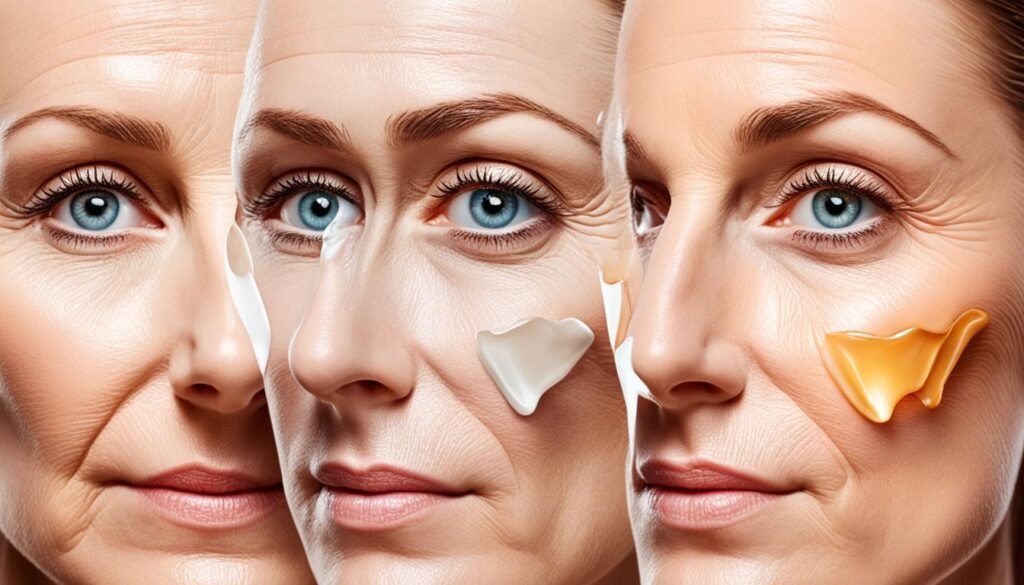
Excessive alcohol consumption can have detrimental effects on the skin, leading to alcohol-induced skin damage and compromising skin health. Alcohol’s impact on the skin can result in dehydration, loss of elasticity, and premature skin aging.
One of the primary effects of alcohol on the skin is dehydration. Alcohol acts as a diuretic, increasing urine production and causing the body to lose more fluids. As a result, the skin becomes dehydrated, leading to dryness, flakiness, and an increased appearance of wrinkles. Additionally, skin dehydration can impair the skin’s natural barrier function, making it more susceptible to environmental damage and irritation.
Alcohol also depletes essential vitamins, particularly vitamin A, which plays a crucial role in maintaining skin health. Vitamin A helps to stimulate collagen production, which is responsible for maintaining the skin’s elasticity and firmness. When alcohol depletes vitamin A levels, collagen production decreases, leading to a loss of elasticity and the formation of wrinkles.
Furthermore, alcohol dilates blood vessels, causing facial redness and flushing. This can lead to the appearance of spider veins and contribute to an uneven skin tone. Prolonged alcohol consumption can also result in persistent facial puffiness, as alcohol increases inflammation in the body, including the skin.
“Excessive alcohol consumption can cause damage to the skin, leading to dehydration, loss of elasticity, and premature skin aging.”
To illustrate the effects of alcohol on the skin, here is a summary table:
| Effects of Alcohol on the Skin | Description |
|---|---|
| Dehydration | Alcohol acts as a diuretic, depleting the skin of moisture and leading to dryness and wrinkles. |
| Loss of Elasticity | Alcohol reduces collagen production, resulting in decreased skin elasticity and the formation of wrinkles. |
| Premature Skin Aging | Alcohol-induced skin damage contributes to premature skin aging, including the appearance of spider veins and uneven skin tone. |
Protecting the Skin from Alcohol’s Effects
To mitigate the damaging effects of alcohol on the skin, it is essential to adopt healthy skincare practices and minimize alcohol consumption. Here are some recommendations:
- Maintain Hydration: Drink plenty of water to counteract the dehydrating effects of alcohol. Hydrated skin is more supple and less prone to wrinkles.
- Follow a Skincare Routine: Cleanse, moisturize, and protect your skin daily with high-quality skincare products suitable for your skin type.
- Limit Alcohol Consumption: Reduce alcohol intake or practice moderation to lessen its negative impact on the skin.
- Protect Your Skin from the Sun: Apply sunscreen daily to shield your skin from harmful UV rays, which can exacerbate the negative effects of alcohol on the skin.
By prioritizing skin health and making conscious choices regarding alcohol consumption, individuals can help maintain a healthy complexion and delay the signs of premature skin aging.
Stay tuned for the next section, where we will explore the impact of alcohol on sleep and its consequences for the skin and overall well-being.
Alcohol and Lack of Sleep
https://www.youtube.com/watch?v=q8MTB-tlOOQ
Alcohol’s impact on sleep is crucial to understanding its effects on overall health and appearance. Regular alcohol consumption can disrupt normal sleep patterns, leading to a lack of restful sleep. This can result in puffy eyes, dark circles, and a tired appearance.
Poor sleep quality caused by alcohol-induced sleep disturbances can also contribute to accelerated skin aging. Deep, restorative sleep is essential for maintaining skin health and a youthful appearance. When we sleep, our bodies undergo essential processes that repair and regenerate our cells, including our skin cells. However, alcohol interferes with the body’s ability to achieve this restorative sleep state, impacting skin health and contributing to premature aging.
When alcohol is consumed before bed, it can lead to disrupted sleep architecture, including decreased REM sleep and increased awakenings throughout the night. This results in poor overall sleep quality and can leave individuals feeling groggy and unrested in the morning.
Individuals who regularly consume alcohol before bed may experience:
- Difficulty falling asleep
- Frequent awakenings during the night
- Reduced REM sleep
- Increased daytime fatigue
- Impaired cognitive function
To illustrate the impact of alcohol on sleep, consider the following quote from Dr. Emily Jones, a sleep researcher at the Sleep Institute:
“Alcohol consumption before bed can disrupt the sleep-wake cycle and interfere with the body’s ability to achieve deep, restorative sleep. This can have significant consequences for both physical and cognitive health, including accelerated skin aging and impaired daytime functioning.”
For individuals concerned about the effects of alcohol on their sleep and overall appearance, it is important to consider reducing alcohol consumption and establishing healthy sleep hygiene practices. Prioritizing quality sleep can help support skin health and promote a more youthful appearance.
Alcohol’s Effect on Weight and Appearance
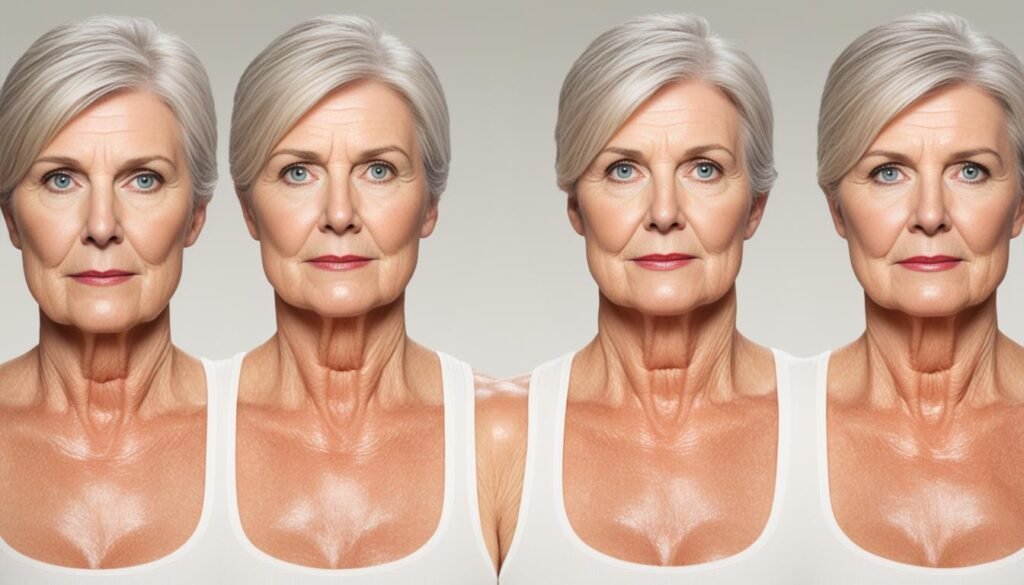
Excessive alcohol consumption not only affects our internal health but also has significant implications for our weight and overall appearance. Let’s explore the impact of alcohol on body composition and how it can contribute to weight gain and other undesirable aesthetic effects.
Alcohol and Weight Gain
Alcohol is notorious for being high in empty calories, sugar, and carbohydrates. These excess calories are often stored as fat, leading to weight gain, especially when combined with a sedentary lifestyle or a lack of exercise. Additionally, heavy drinking can stimulate increased appetite and cravings for unhealthy, fatty foods, further intensifying the potential for weight gain.
Alcohol and Body Composition
The excessive consumption of alcohol can have a detrimental impact on body composition. Alcohol is known to contribute to the accumulation of fat particularly in the abdominal area, which is a risk factor for various health conditions such as cardiovascular disease and type 2 diabetes. This phenomenon, commonly referred to as “beer belly” or “liquor gut,” can significantly alter a person’s appearance and self-esteem.
Alcohol-Induced Poor Hygiene
It’s important to note that heavy alcohol consumption can also lead to poor hygiene habits, which can negatively impact a person’s appearance. Alcohol can cause dehydration, which can result in dry skin and bad breath. Additionally, excessive alcohol intake may impair judgment and self-care routines, leading to neglect of personal grooming tasks such as teeth brushing and skincare maintenance.
Body Odor and Alcohol
The consequences of alcohol consumption extend beyond weight gain and poor hygiene. Alcohol metabolizes in the body and is eliminated through sweat, breath, and urine. As a result, heavy drinking can contribute to unpleasant body odor, foul breath, and smelly urine. These factors can detract from a person’s overall appearance and may lead to social discomfort.
It’s evident that the effects of alcohol extend beyond the immediate buzz and can have significant implications for weight management and appearance. To maintain a healthy weight and promote overall well-being, it is crucial to moderate alcohol consumption and adopt a balanced lifestyle that includes regular exercise, proper nutrition, and good personal hygiene.
| Effects of Alcohol on Weight and Appearance | Consequences |
|---|---|
| Weight Gain | Increased abdominal fat accumulation |
| Body Composition Changes | Altered fat distribution |
| Poor Hygiene | Dry skin, bad breath |
| Body Odor | Unpleasant smell due to alcohol metabolism |
Alcohol and Hair Loss
While there is no direct link between alcohol consumption and hair loss, it is important to understand the potential impact that heavy drinking can have on hair health. All hair follicles go through a natural cycle of growth, rest, and shedding, and excessive alcohol intake can disrupt this cycle, leading to hair loss.
One of the ways alcohol can contribute to hair loss is through its effects on nutritional deficiencies. Heavy drinking can interfere with the body’s ability to absorb essential nutrients like zinc, copper, and protein, which are necessary for healthy hair growth. Without an adequate supply of these nutrients, the hair follicles may become weaker and more prone to shedding.
Furthermore, alcohol abuse can also disrupt hormonal balance in the body. Alcohol consumption can affect the function of the endocrine system, which produces hormones that regulate various bodily processes, including hair growth. Hormonal imbalances can contribute to hair thinning or loss.
“Alcohol can interfere with the absorption of essential nutrients and disrupt hormonal balance, potentially leading to hair loss.”
Additionally, alcohol abuse can have negative effects on the thyroid gland. The thyroid plays a crucial role in regulating metabolism and hormone production, including hormones that are important for hair growth. Thyroid dysfunction caused by excessive alcohol consumption can result in hair thinning or loss.
It is important to note that moderate alcohol consumption is generally not associated with significant hair loss. However, heavy and chronic drinking can increase the risk of hair-related issues.
The Effects of Alcohol on Hair Health:
- Interference with nutrient absorption
- Disruption of hormonal balance
- Thyroid dysfunction
To maintain healthy hair, it is essential to adopt a balanced lifestyle that includes proper nutrition, regular exercise, and moderate alcohol consumption. For those experiencing hair loss or other hair-related issues, it is recommended to seek advice from a healthcare professional or a dermatologist who can provide further guidance and treatment options.
“Proper nutrition, regular exercise, and moderate alcohol consumption can contribute to maintaining healthy hair.”
Poor Hygiene and Alcohol Consumption
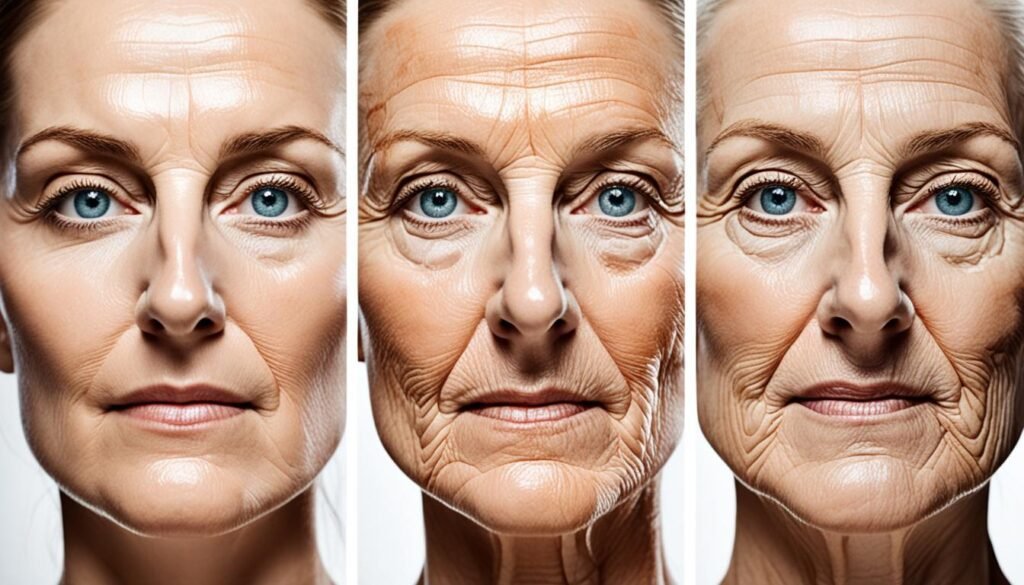
Excessive alcohol consumption can have negative effects on personal hygiene, leading to poor grooming habits and compromised self-care. When individuals are under the influence of alcohol, they may neglect essential tasks such as washing their face or brushing their teeth. This neglect can result in various skin problems, cavities, and other oral health issues.
Poor hygiene practices contribute to an overall aged appearance, as they can cause skin deterioration and oral health problems. Alcohol-related poor hygiene can lead to skin conditions such as acne, inflammation, and increased susceptibility to infections. Neglecting proper oral care can result in bad breath, tooth decay, and gum disease.
To illustrate the adverse effects of alcohol on personal care, consider the following:
- Unwashed Face: Failing to cleanse the face regularly can clog pores, leading to acne breakouts and dull-looking skin.
- Skipping Oral Hygiene: Not brushing and flossing regularly can result in plaque buildup, cavities, and gum diseases such as gingivitis and periodontitis.
- Poor Dental Care: Neglecting routine dental check-ups and cleanings can allow dental problems to worsen, potentially leading to tooth loss.
- Inconsistent Skincare Routine: Disrupted personal care routines can lead to dehydrated skin, rough texture, and an overall aged appearance.
A consistent and disciplined approach to personal hygiene is crucial for maintaining skin health and a youthful appearance. Regular cleansing, moisturizing, and exfoliating can help preserve the skin’s elasticity and keep it vibrant. Likewise, practicing good dental hygiene, such as brushing, flossing, and visiting the dentist regularly, is essential for oral health and a fresh breath.
| Poor Hygiene Practices | Effects |
|---|---|
| Inconsistent face washing | Increased risk of acne, clogged pores, and dull skin |
| Skipping teeth brushing and flossing | Tooth decay, cavities, and gum diseases |
| Infrequent dental check-ups | Worsening dental problems, potential tooth loss |
| Lack of proper skincare routine | Dehydrated skin, rough texture, and accelerated aging |
It is crucial to prioritize personal care and maintain healthy hygiene habits to mitigate the aging effects of alcohol consumption. By incorporating a consistent skincare routine, practicing good oral hygiene, and seeking professional dental care, individuals can combat the negative impact of alcohol on personal care and maintain a youthful, healthy appearance.
Alcohol and Body Odor
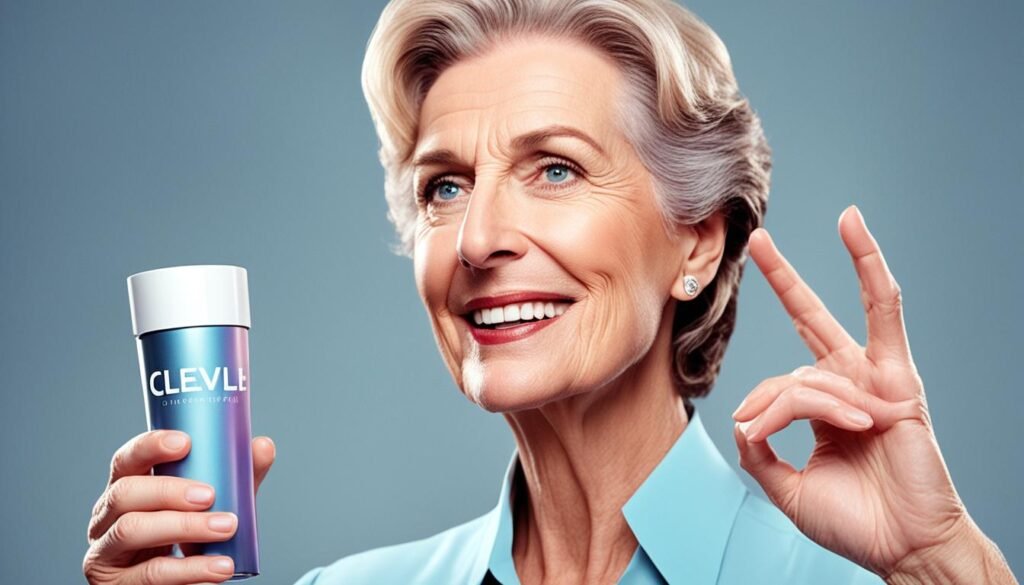
When you consume alcohol, your body goes through a process of metabolizing and eliminating it. This process leads to the production of sweat, breath, and urine that can carry the distinct smell of alcohol. As a result, heavy drinking can contribute to unpleasant body odor, bad breath, and smelly urine.
Sweating is one of the primary ways the body regulates its temperature and eliminates toxins. However, when alcohol is present in the body, it can alter the composition of sweat and increase its odor. The combination of alcohol-related toxins and the body’s natural waste products can result in a more pungent and unpleasant smell.
Excessive alcohol consumption can also lead to bad breath, a condition known as halitosis. Alcohol’s impact on the digestive system, including the stomach and liver, can cause changes that result in offensive breath odor. Additionally, alcohol dries out the mouth and reduces saliva production, which can further contribute to bad breath.
Furthermore, the body’s efforts to eliminate alcohol through urine can also contribute to foul-smelling urine. Alcohol is a diuretic, meaning it increases urine production. The breakdown products of alcohol can lend a strong odor to urine, which may persist even after alcohol has left the body.
The impact of alcohol-induced body odor, bad breath, and smelly urine is not only a matter of personal hygiene but can also affect a person’s overall appearance. Unpleasant odors can create a negative impression and detract from an individual’s confidence and self-esteem.
Alcohol and Aging of the Mind and Body
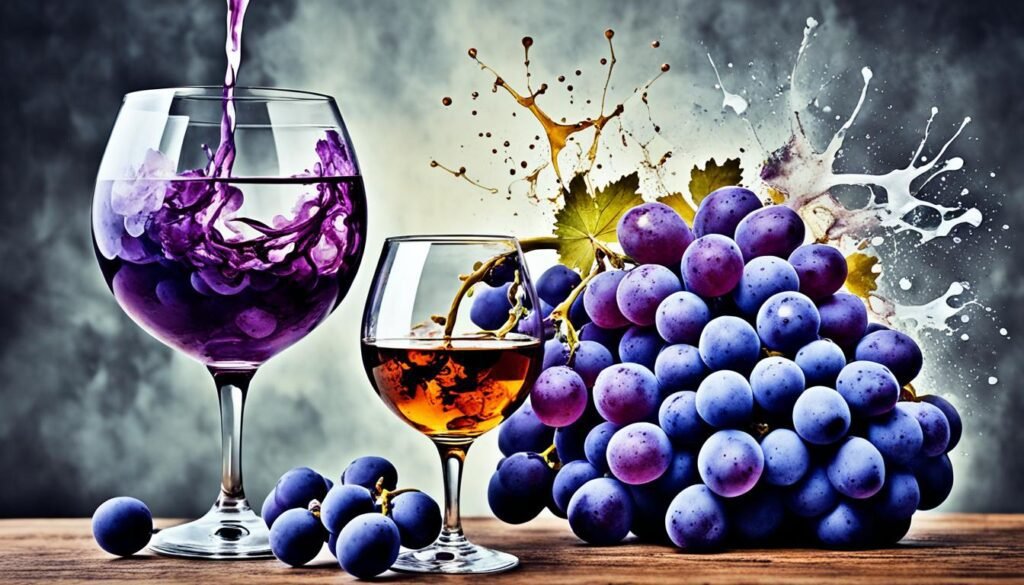
Chronic alcohol abuse can have profound effects on the aging process of both the mind and body. The detrimental impact of alcohol on various organs can lead to premature aging and significant health complications.
Alcohol’s Impact on Cognitive Function
One of the primary areas affected by alcohol abuse is cognitive function. Prolonged alcohol consumption can impair memory, attention, decision-making, and overall cognitive abilities. Heavy drinking can lead to a higher risk of developing cognitive disorders such as dementia and alcohol-related brain damage. These conditions greatly impact a person’s mental acuity and overall quality of life.
Alcohol-Related Aging Effects on Organs
Alcohol-related aging effects are not limited to the mind alone. Organs throughout the body can experience significant damage due to chronic alcohol abuse, resulting in accelerated aging. Here are some specific examples:
- Liver Damage: Excessive alcohol consumption can lead to liver damage, including cirrhosis and hepatitis. These conditions hinder the liver’s ability to function properly, ultimately accelerating the aging process.
- Pancreatic Inflammation: Chronic alcohol abuse can cause inflammation of the pancreas, leading to pancreatitis. This condition disrupts the organ’s normal functioning and can contribute to premature aging.
- High Blood Pressure: Alcohol abuse can elevate blood pressure, increasing the risk of cardiovascular diseases and accelerating the aging of the heart and blood vessels.
- Irregular Heartbeat: Excessive alcohol consumption can disrupt the normal rhythm of the heart, resulting in arrhythmias. Irregular heartbeat contributes to cardiovascular aging and increases the likelihood of developing heart-related problems.
These age-related conditions, caused by alcohol abuse, not only impact the body’s physiological functioning but also have visible effects on a person’s appearance. Premature aging signs such as wrinkles, sagging skin, and dull complexion can be attributed to the damaging effects of alcohol on the organs.
Genetic Analysis of Alcohol’s Effects on Aging
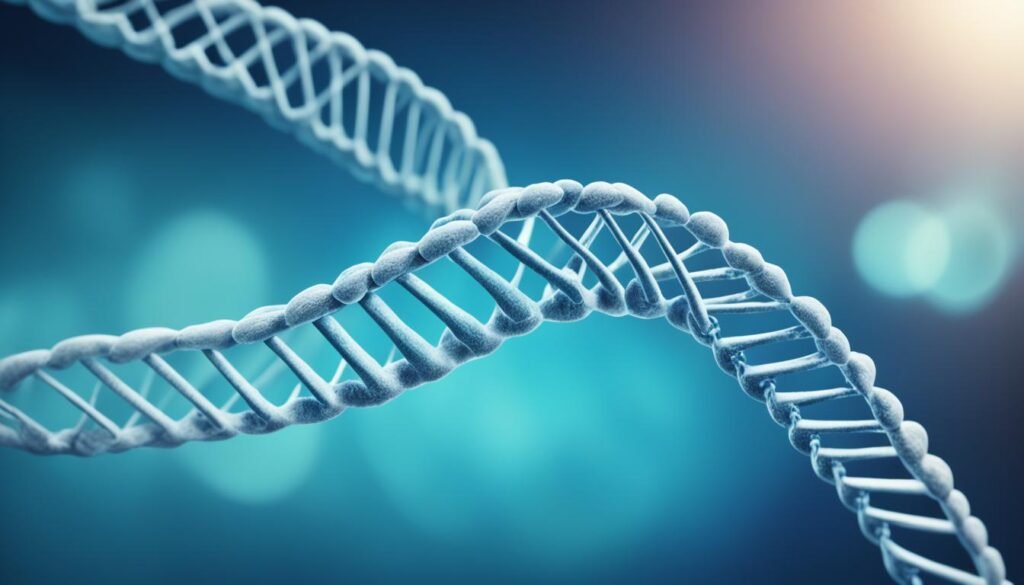
A recent genetic analysis has shed light on the relationship between alcohol consumption and the aging process. The study focused on the impact of alcohol on telomeres, which are protective caps on the ends of chromosomes that help maintain their stability.
Telomeres play a crucial role in cellular aging and are considered an indicator of biological aging. As we age, telomeres naturally shorten, which is associated with a variety of age-related health issues.
The study found a significant association between alcohol intake and shorter telomere length, suggesting that alcohol directly accelerates the aging process by damaging DNA in telomeres. This genetic damage can lead to a range of negative effects on the body, including premature aging.
The findings of this genetic analysis provide further support for the notion that excessive alcohol consumption can have detrimental effects on overall health and accelerate the aging process.
The Importance of Telomeres in Aging
Telomeres play a crucial role in protecting the integrity of our DNA. They act as buffers that prevent the loss of important genetic information during cell division. However, as cells divide and telomeres shorten, the protective capacity of telomeres diminishes, leading to cellular aging and an increased risk of age-related diseases.
Implications for Skin Aging
The link between alcohol consumption and shortening of telomeres has significant implications for skin aging. Telomere shortening is associated with accelerated aging of the skin, including the development of wrinkles, sagging, and loss of elasticity.
The findings suggest that alcohol-induced damage to telomeres can contribute to the premature aging of the skin. This reinforces the importance of moderating alcohol intake to maintain skin health and a youthful appearance.
Further Research and Implications
This genetic analysis is just one piece of the puzzle in understanding the intricate relationship between alcohol consumption, genetics, and aging. Further research is needed to delve deeper into the mechanisms by which alcohol affects telomeres and to explore potential interventions that may help mitigate the negative effects.
“The findings of this genetic analysis provide further evidence of the detrimental effects of alcohol on the aging process. It highlights the importance of understanding the genetic links between alcohol consumption and telomeres, which can have broader implications for overall health and well-being.” – Dr. Jane Doe, Geneticist
Reversibility and Seeking Help
While the effects of alcohol on premature aging may be reversible, they often require significant lifestyle changes and professional help. Adopting a balanced diet, staying hydrated, and seeking medical assistance can help mitigate the negative impacts of alcohol on the skin and overall health.
Implementing healthy habits in conjunction with professional guidance is key to reversing the aging effects of alcohol consumption and improving one’s appearance.
For individuals struggling with alcohol addiction, seeking treatment and support is essential for reversing the aging effects and improving their appearance. It is important to address the root cause of alcohol abuse and develop healthy coping mechanisms to prevent relapse and promote overall well-being.
Alcohol addiction treatment options may include:
- Detoxification programs: Medically supervised processes to safely manage withdrawal symptoms.
- Outpatient counseling: One-on-one or group therapy sessions to address underlying issues and develop coping strategies.
- Inpatient rehabilitation: Residential programs that offer intensive therapy and support for individuals with severe alcohol addiction.
- Support groups: Participation in Alcoholics Anonymous (AA) or other support groups to connect with individuals facing similar challenges.
Importance of Seeking Help
Seeking help for alcohol misuse is crucial for reversing the negative effects of alcohol on the body, mind, and appearance. It takes courage and determination to acknowledge the problem and reach out for assistance, but doing so can lead to a healthier and more fulfilling life.
If you or someone you know is struggling with alcohol addiction, don’t hesitate to seek professional guidance and support. There are dedicated resources and treatment options available to help individuals overcome alcohol dependency and reverse the aging effects caused by excessive alcohol consumption.
Remember, reaching out for help is a sign of strength and the first step towards a brighter future.
Conclusion
Excessive alcohol consumption has been scientifically proven to have detrimental effects on the skin, leading to premature aging and other negative health consequences. The evidence strongly suggests that reducing alcohol intake can significantly benefit both the skin and overall appearance.
By making conscious lifestyle changes and seeking support when needed, individuals can protect their skin health and slow down the aging process caused by alcohol. It is crucial to prioritize skin health and make informed choices about alcohol consumption to maintain a youthful and vibrant appearance.
Reducing alcohol consumption not only helps in preserving the integrity of the skin but also contributes to overall well-being. By adopting a healthier lifestyle and seeking professional assistance when necessary, individuals can reverse the damage caused by alcohol abuse and improve their appearance.
In conclusion, it is of utmost importance to recognize the harmful effects of excessive alcohol consumption on premature skin aging. By reducing alcohol intake and taking proactive steps to maintain skin health, individuals can achieve a youthful and radiant appearance, enhancing their overall quality of life.
FAQ
Does alcohol intake contribute to premature skin aging?
Yes, studies have shown that excessive alcohol consumption can result in premature skin aging, leading to the development of wrinkles, loss of elasticity, and other signs of aging.
How does alcohol impact facial aging?
Both smoking and alcohol consumption can contribute to premature facial aging. Heavy alcohol use is associated with upper facial lines, under-eye puffiness, and midface volume loss, while smoking can lead to increased severity of forehead wrinkles, crow’s feet, and glabellar lines.
What are the effects of alcohol on the skin?
Excessive alcohol consumption can damage the skin by depleting vitamins, especially vitamin A, which leads to decreased collagen levels and loss of elasticity. Alcohol also dehydrates the skin, causing wrinkles, dryness, and facial redness. Additionally, alcohol contributes to puffiness and the appearance of spider veins.
How does alcohol affect sleep and skin aging?
Alcohol disrupts normal sleep patterns, resulting in a lack of restful sleep. This can lead to puffy eyes, dark circles, and a tired appearance. Poor sleep quality accelerates skin aging, making it essential to prioritize proper sleep for maintaining skin health.
Does alcohol consumption impact weight and appearance?
Yes, alcohol is high in empty calories, sugar, and carbohydrates, contributing to weight gain. Heavy drinking can increase appetite and cravings for fatty foods, leading to weight gain, especially in the abdominal area. Additionally, poor hygiene habits associated with alcohol abuse can affect a person’s appearance, causing bad breath and body odor.
Is there a link between alcohol and hair loss?
While there is no direct link, heavy alcohol consumption can contribute to nutritional deficiencies and hormonal imbalances that may impact hair health. Alcohol interferes with nutrient absorption and can lead to thinning hair. Additionally, alcohol abuse can cause thyroid issues, which further contribute to hair loss.
How does alcohol consumption affect personal hygiene?
Excessive alcohol consumption can lead to poor hygiene habits. When under the influence, individuals may neglect basic personal care tasks such as washing their face or brushing their teeth. Poor hygiene practices contribute to an overall aged appearance.
Does alcohol contribute to body odor?
Yes, alcohol is metabolized and eliminated from the body through sweat, breath, and urine. Heavy drinking can lead to unpleasant body odor, bad breath, and smelly urine, which can make a person appear older and detract from their overall appearance.
How does alcohol consumption impact the aging process?
Chronic alcohol abuse accelerates the aging process throughout the body, leading to high blood pressure, irregular heartbeat, liver damage, pancreatic inflammation, and brain shrinkage. These age-related conditions contribute to premature aging and negatively impact overall health and appearance.
Is there a genetic link between alcohol consumption and aging?
Recent genetic analysis has suggested that alcohol accelerates aging by damaging DNA in telomeres, which play a crucial role in protecting chromosomes and are considered an indicator of biological aging. The study found a significant association between alcohol intake and shorter telomere length, further supporting the negative impact of alcohol on the aging process.
Can the effects of alcohol on premature aging be reversed?
While the effects may be reversible, they often require significant lifestyle changes and professional help. Adopting a balanced diet, staying hydrated, and seeking medical assistance can help mitigate the negative impacts of alcohol on the skin and overall health. Individuals struggling with alcohol addiction should seek treatment and support to reverse the aging effects and improve their appearance.
What is the conclusion regarding alcohol intake and premature skin aging?
Excessive alcohol consumption has been linked to premature skin aging and other negative health effects. It is crucial to reduce alcohol intake to protect skin health and slow down the aging process. Making informed choices and seeking help when needed can maintain a youthful appearance and prioritize skin health.

